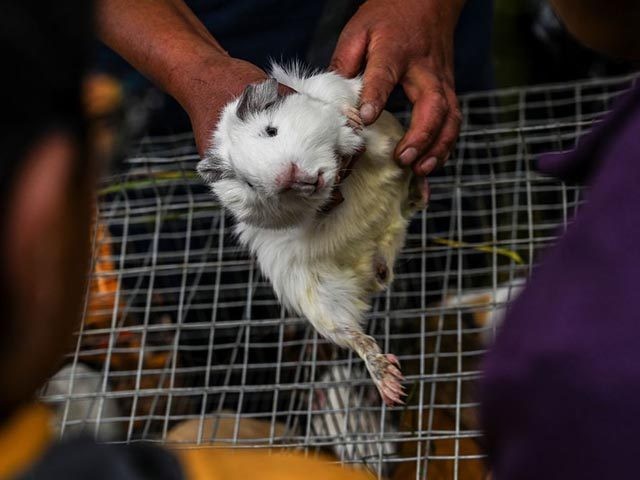A government television broadcast in Cuba this week urged citizens to eat guinea pig and other rodents, suggesting rodent meat is more nutritious and “sustainable” than pork or beef, Cuban outlets reported on Wednesday.
The Communist Party has presided over major food shortages in Cuba for decades, beginning almost immediately following the Cuban Revolution in 1959. In recent years, the Castro regime has blamed President Donald Trump for extensive food shortages and failed distribution of government-mandated rations. While the Trump administration has imposed significant sanctions on the regime in response to the increased frequency of human rights violations against pro-democracy dissidents in the Obama era, these sanctions have targeted elite individuals and military-linked corporations, not sources of food for the general population.
The Cuban Communist Party has systematically silenced dissidents who have exposed how Havana is directly responsible for food shortages in the country, most prominently ecologist Dr. Ariel Ruiz Urquiola, arrested after using a plot of land in Pinar del Río to prove that a competent government could significantly increase crop production. Ruiz Urquiola now says communist officials infected him with HIV on purpose while in prison.
In an alleged attempt to promote nutritious eating on Tuesday, a news broadcast on Tele Mayabeque, a Communist Party-approved network, revealed that the Castro regime had organized a meeting with chefs to design meals featuring guinea pig meat. The broadcast also encouraged Cubans to “socialize the experience of raising the guinea pig” by the entire family.
Cuban officials, the reporter explained, sought to promote the alleged health benefits of eating rodents “to incorporate this animal protein to the family table.”
“According to the experts, the average protein content [of guinea pig] is 19 percent, superior to porcine and bovine meat. Its consumption is a clear ally against anemia and malnutrition,” the reporter claimed.
To “elevate the culinary culture” around eating rodents, the report detailed, the government asked a group of Cuban chefs to design new meals around guinea pig as a core protein. One chef noted that they designed 11 dishes, but ran out of time. Ideas left on the cutting room floor included rodent meatballs and hamburgers.
“Maybe with two guinea pigs we can make six rations of meatballs so then you have another preparation that can go to homes, to restaurants,” the chef said.
Rodents, the report concluded, may represent “a sustainable way to achieve food sovereignty.”
Traditional Cuban cuisine — which survives largely in the United States, but not in Cuba — relies heavily on pork and beef as central proteins. Roasting an entire pig to feed a family, as in many Caribbean and Hispanic countries, is a tradition for Cubans who live freely on Christmas Eve. Dishes like ropa vieja (“old clothes,” pulled beef in tomato sauce) and ham croquettes are central to Cuban tradition.
In Cuba itself, many of these dishes have become a memory. Eating pests began replacing traditional dishes in the 1960s. For decades, Cubans used jutía, a rodent native to the Caribbean, to supplement meals, along with turtle, cat, and other meats not typically sold for consumption. The practice peaked in the 1990s, known as the “Special Period,” following the collapse of the Soviet Union.
Under the management of Miguel Díaz-Canel, technically the nation’s president but subordinate to dictator and Communist Party secretary Raúl Castro, the Communist Party has become more vocal in encouraging the consumption of bizarre meats to hide its inability to procure safe-to-eat pork, chicken, or beef. Last year, “revolutionary” Gen. Guillermo García Frías became the subject of popular outrage and mockery after appearing on state television and encouraging the consumption of jutía, alligator, and ostrich. Ostriches are not native to Cuba and have no significant presence there, but García claimed ostrich eggs were plentiful and large enough to feed many, making them an efficient source of protein.
State media followed García’s suggestion by publishing reports claiming other inedible items could help supplement the meager Cuban diet. In October 2019, Radio Rebelde, a state propaganda outlet, recommended that Cubans begin eating banana peels for their alleged potassium content.
“Plantain or banana is one of the most consumed fruits in the world,” Radio Rebelde claimed. “What you might not know is that the peel is just as nutritious as the interior: it contains iron, potassium, and vitamins B, C, and K and, if that were not enough, also contains good amounts of manganese, fiber, antioxidants, and copper.”
The report went on to claim that rubbing a banana peel on one’s forehead could help calm a headache.
“Banana peel contains a good amount of tryptophan. This amino acid helps promote the production of serotonin, known as the ‘happiness hormone,’” according to the state report. “It regulates mood and if one has low levels of it, this translates into a bad mood, depression, and irritability.”
The context of recommending eating banana peels was months of Cubans complaining — in some cases, even protesting — their lack of access to basic food items like chicken meat, eggs, flour, and milk. Those who did manage to acquire some meat complained that it was clearly rancid, sold at high temperatures and featuring a green unpleasant color. Some who ate it took to social media to warn that they experienced food poisoning.
Cuban officials, including Díaz-Canel, imposed stricter food rations following the 2019 fiasco and blamed Trump for the action. Some officials took another approach, appearing on state media and claiming that Cubans supported and enjoyed being under strict food rations.
This year, state media claimed that true hunger and food shortages were not happening in Cuba, but in the United States, due to the fact that private corporations were legal there.

COMMENTS
Please let us know if you're having issues with commenting.